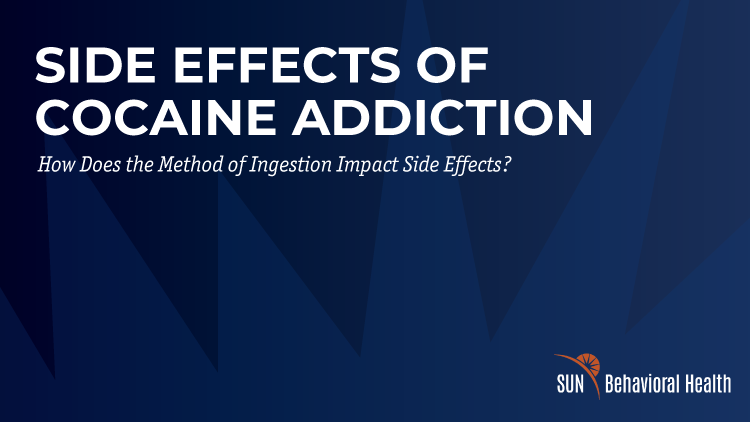Services
- Home
- Mental Health Services
- Who We Treat
- How We Treat
- Patients & Visitors
- About
close

While watching the Houston Texans play on Sunday afternoon with friends, you decide to step out to smoke cocaine to calm your nerves surrounding the plays in the game. The side effects of cocaine don’t last too long, but it lasts long enough to allow you to remain euphoric during the game. You aren’t interested in the chili and brisket your friends brought. Cocaine always takes away your appetite and makes you feel nauseated. When you return from outside, you begin having an asthma attack. Grabbing your inhaler, your friends raise an eyebrow in your direction.
If this sounded familiar, you may be experiencing side effects of cocaine addiction, and you are not alone. In 2021, 19.2% of substance arrests in Texas involved cocaine.
Perhaps one of your friends at the game recognized what you were doing and convinced you to seek treatment. You promised them you would call somewhere in the morning since you were sure nobody would take you today on a Sunday. However, many change their minds when it becomes more “convenient.” At SUN Behavioral Health Houston, we recognize this can happen, so we offer 24/7 crisis care that allows you to get started on your treatment when you decide to instead of risking your mind changing because of the side effects of cocaine. Today, we will discuss more of the side effects of cocaine addiction.
There are several ways that people can ingest cocaine. These include:
Injecting - can lead to illnesses such as hepatitis C, HIV, and soft tissue infections.
The timeframe for when someone might experience the side effects of cocaine can depend on how they consume cocaine. When someone snorts cocaine, they will often feel the effects immediately, and they will last around an hour. Smoking cocaine results in feeling the effects within a few seconds most of the time; however, the effects will typically last a few minutes.
Those who orally take cocaine will generally feel the effects in a few minutes, and the effects will usually last about half an hour. Typically, injecting cocaine takes around 15 seconds for someone to feel the effects, but the effects might only last a few minutes.
The exact length of time for side effects to start and end will depend on how long you’ve been using cocaine and if you used other substances alongside cocaine.
There are some “positive” side effects that people might report. These side effects often encourage them to continue to use cocaine, but they are often short-term. The most common of these include feelings of euphoria or increased energy. Others might report that they can perform tasks more quickly when they have taken cocaine in comparison to when they aren’t using cocaine. Not all “positive” side effects are positive in the long run. People commonly report that they don’t have to sleep or eat as much, which can lead to weight loss and other concerns.
However, there can be some more uncomfortable short-term side effects. Some people experience more sensitive senses, such as sound, touch, and sight. They might also experience restlessness, anxiety, and irritability. Symptoms of vertigo and muscle twitching are also common. Other people might experience headaches, abdominal pain, or nausea.
In extreme cases, people may experience more dangerous side effects. These can include an increased heart rate or body temperature. Some people have experienced heart attacks and seizures. Behaviorally, cocaine can create erratic or violent behaviors that can put you or others in danger.
Over the long-term use of cocaine, the brain becomes less sensitive to natural reinforcers in the reward pathways. Signs of withdrawal can also begin to occur when someone has gone a long time without consuming. Tolerance to cocaine can also develop over time. People will need more cocaine to get the same level of effects. This increase in tolerance can increase one’s chances of experiencing an overdose.
People who regularly use cocaine might have a loss of sense of smell, problems swallowing, or frequent nosebleeds. If they inject cocaine, they might have track marks on their forearms and run the risk of developing HIV or hepatitis. Blood flow becomes reduced, which can lead to ulcerations. Because people are less likely to eat when they’re partaking in cocaine, they might experience malnourishment and weight loss.
Long-term use can also cause bleeding in the brain or disorders such as Parkinson’s disease. People might also have impairments with attention, memory, and performing motor tasks with repeated use.

Using cocaine can create a significant impact on both your body and your mind. For example, your body will produce more dopamine when you take cocaine. Dopamine creates pleasure and euphoria, which is a common symptom of cocaine use. However, when you are using cocaine regularly, your brain will feel like it needs cocaine to produce comfortable levels of dopamine, resulting in withdrawal symptoms. The brain is used to large doses of dopamine when cocaine is being used. When it is back to normal levels of dopamine, it feels underwhelmed.
Other than the increase in dopamine, other physiological effects can happen when someone is using cocaine. They might have difficulty handling interpersonal relationships or cannot process information fully. Some people experience agitation, irritability, and mood swings. Oftentimes, the person using cocaine might feel like cocaine has taken control of their lives. These emotions can add to the difficulty in managing relationships.
There can also be more uncomfortable or dangerous physiological side effects. For example, they might experience panic attacks and other anxiety symptoms. While not necessarily dangerous, anxiety symptoms can make people feel uncomfortable. Depression is also common, and with ongoing use, it can result in suicidal ideation. Some people might experience hallucinations, paranoia, and violent outbursts. These symptoms can result in putting yourself and others in danger.
Physical effects can also occur when someone has a cocaine use disorder. They might feel more energetic or talkative, or they might also have more serious physical effects, such as an overdose or death caused by seizures or cardiac arrest.
People who use cocaine regularly can experience effects, such as weight loss because of the loss of appetite associated with cocaine use. Sexual dysfunction, constricted blood vessels, and chest pain can also occur, as can heart disease and stroke. Some people might also experience regular nosebleeds, while others experience insomnia.
One of the more dangerous side effects is that cocaine can make people feel like they can do anything combined with impaired judgment. This combination makes them more likely to participate in risky behaviors that can result in death or illnesses.
The best way to avoid experiencing these side effects is to seek treatment from cocaine. While it might seem scary initially, the result will bring a healthier version of yourself.

The best way to avoid or lessen the chance of developing these long-term effects is to seek cocaine addiction treatment. While treatment can bring terrifying emotions, and it might be the hardest thing you will ever have to do, it can be a remarkable experience. Even if it seems unattainable, remember you don’t have to do it alone. Many people achieve recovery from cocaine every day, and you can too.
Located in Houston, SUN Behavioral Health meets unmet needs in our community. Taking the first step in your cocaine recovery journey can come with several questions. You want to know if the people you are asking to help you can help you. We offer no-cost care assessments that have telehealth options. Before paying a bill, you can meet with a representative to ask questions and determine the best care plan. For more information or to start your recovery journey today, call us at 713-796-2273.